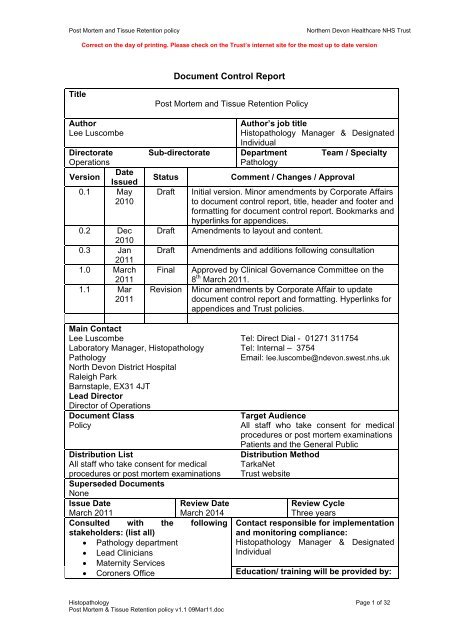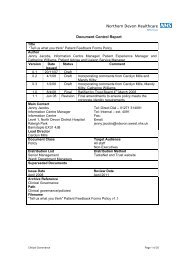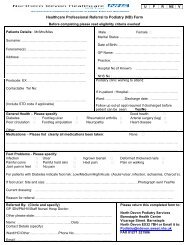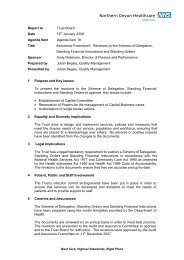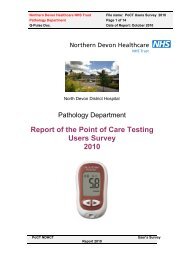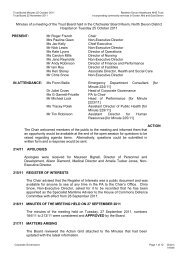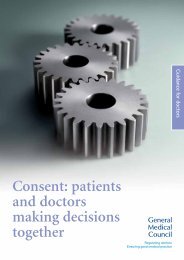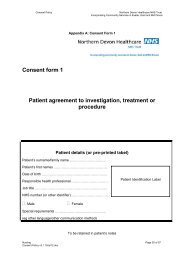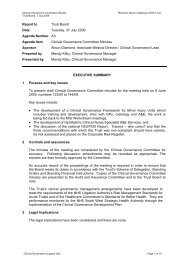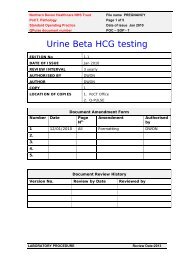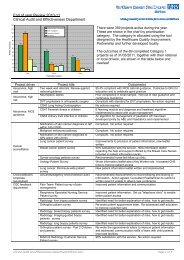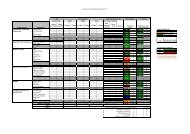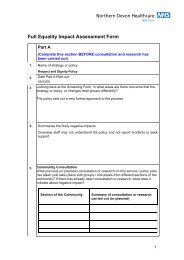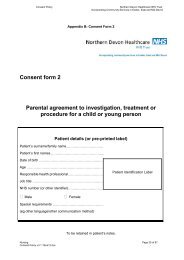Post Mortem & Tissue Retention policy - Northern Devon Healthcare ...
Post Mortem & Tissue Retention policy - Northern Devon Healthcare ...
Post Mortem & Tissue Retention policy - Northern Devon Healthcare ...
You also want an ePaper? Increase the reach of your titles
YUMPU automatically turns print PDFs into web optimized ePapers that Google loves.
<strong>Post</strong> <strong>Mortem</strong> and <strong>Tissue</strong> <strong>Retention</strong> <strong>policy</strong><br />
<strong>Northern</strong> <strong>Devon</strong> <strong>Healthcare</strong> NHS Trust<br />
Correct on the day of printing. Please check on the Trust’s internet site for the most up to date version<br />
Document Control Report<br />
Title<br />
Author<br />
Lee Luscombe<br />
Directorate<br />
Operations<br />
Date<br />
Version<br />
Issued<br />
0.1 May<br />
2010<br />
0.2 Dec<br />
2010<br />
0.3 Jan<br />
2011<br />
1.0 March<br />
2011<br />
1.1 Mar<br />
2011<br />
<strong>Post</strong> <strong>Mortem</strong> and <strong>Tissue</strong> <strong>Retention</strong> Policy<br />
Sub-directorate<br />
Status<br />
Draft<br />
Draft<br />
Draft<br />
Final<br />
Revision<br />
Author’s job title<br />
Histopathology Manager & Designated<br />
Individual<br />
Department Team / Specialty<br />
Pathology<br />
Comment / Changes / Approval<br />
Initial version. Minor amendments by Corporate Affairs<br />
to document control report, title, header and footer and<br />
formatting for document control report. Bookmarks and<br />
hyperlinks for appendices.<br />
Amendments to layout and content.<br />
Amendments and additions following consultation<br />
Approved by Clinical Governance Committee on the<br />
8 th March 2011.<br />
Minor amendments by Corporate Affair to update<br />
document control report and formatting. Hyperlinks for<br />
appendices and Trust policies.<br />
Main Contact<br />
Lee Luscombe<br />
Laboratory Manager, Histopathology<br />
Pathology<br />
North <strong>Devon</strong> District Hospital<br />
Raleigh Park<br />
Barnstaple, EX31 4JT<br />
Lead Director<br />
Director of Operations<br />
Document Class<br />
Policy<br />
Distribution List<br />
All staff who take consent for medical<br />
procedures or post mortem examinations<br />
Superseded Documents<br />
None<br />
Issue Date<br />
Review Date<br />
March 2011<br />
March 2014<br />
Consulted with the following<br />
stakeholders: (list all)<br />
Pathology department<br />
Lead Clinicians<br />
Maternity Services<br />
Tel: Direct Dial - 01271 311754<br />
Tel: Internal – 3754<br />
Email: lee.luscombe@ndevon.swest.nhs.uk<br />
Target Audience<br />
All staff who take consent for medical<br />
procedures or post mortem examinations<br />
Patients and the General Public<br />
Distribution Method<br />
TarkaNet<br />
Trust website<br />
Review Cycle<br />
Three years<br />
Contact responsible for implementation<br />
and monitoring compliance:<br />
Histopathology Manager & Designated<br />
Individual<br />
Coroners Office Education/ training will be provided by:<br />
Histopathology Page 1 of 32<br />
<strong>Post</strong> <strong>Mortem</strong> & <strong>Tissue</strong> <strong>Retention</strong> <strong>policy</strong> v1.1 09Mar11.doc
Corporate Affairs Histopathology Manager & Designated<br />
Individual<br />
Approval and Review Process<br />
Clinical Governance Committee<br />
Ratified by Trust Board?<br />
No<br />
Archive Reference<br />
Pathology<br />
Path<br />
G:\Histology\Cellular Pathology Documents\ActiveSOP's\MortuarySOPs\<strong>Post</strong> <strong>Mortem</strong><br />
Filename<br />
<strong>Post</strong> <strong>Mortem</strong> & <strong>Tissue</strong> <strong>Retention</strong> <strong>policy</strong> v1.1 09Mar11.doc<br />
Categories for Tarkanet<br />
Tags for Tarkanet<br />
Pathology<br />
Any revision to an NHSLA <strong>policy</strong> requires the agreement of the Compliance Manager<br />
Corporate Affairs June 2007 Page 2 of 32
<strong>Post</strong> <strong>Mortem</strong> and <strong>Tissue</strong> <strong>Retention</strong> <strong>policy</strong><br />
<strong>Northern</strong> <strong>Devon</strong> <strong>Healthcare</strong> NHS Trust<br />
Contents<br />
Section<br />
Page<br />
1 Introduction 6<br />
2 Purpose 6<br />
3 Definitions 6<br />
3.1 Human <strong>Tissue</strong> Act 6<br />
3.2 Human <strong>Tissue</strong> Authority 6<br />
3.3 Human <strong>Tissue</strong> Authority Codes of Practice 7<br />
3.4 Designated Individual 7<br />
3.5 The Coroner 7<br />
3.6 Coroner’s Office 7<br />
3.7 Coroner’s <strong>Post</strong> <strong>Mortem</strong> 7<br />
3.8 Hospital <strong>Post</strong> <strong>Mortem</strong> 7<br />
3.9 Nominated representative 7<br />
3.10 Qualifying relationship 7<br />
3.11 Scheduled purposes 8<br />
3.12 Consent 8<br />
3.13 <strong>Tissue</strong> 9<br />
3.14 <strong>Tissue</strong> from the living 9<br />
3.15 <strong>Tissue</strong> from the deceased 9<br />
3.16 Wet tissue 9<br />
3.17 <strong>Tissue</strong> samples, blocks and slides 9<br />
3.18 Medical research 9<br />
3.19 Medical record 9<br />
3.20 Quality control material 9<br />
3.21 Clinical disposal 9<br />
3.22 Existing holdings 9<br />
3.23 Late fetal loss 10<br />
3.24 Stillbirth 10<br />
3.25 Neonatal death 10<br />
4 Responsibilities 10<br />
4.1 Designated Individual 10<br />
Histopathology Page 3 of 32<br />
<strong>Post</strong> <strong>Mortem</strong> & <strong>Tissue</strong> <strong>Retention</strong> <strong>policy</strong> v1.1 09Mar11.doc
<strong>Post</strong> <strong>Mortem</strong> and <strong>Tissue</strong> <strong>Retention</strong> <strong>policy</strong><br />
<strong>Northern</strong> <strong>Devon</strong> <strong>Healthcare</strong> NHS Trust<br />
Section<br />
Page<br />
4.2 License Holder 10<br />
4.3 Person Seeking Consent to a Medical Procedure 10<br />
4.4 Person/s Seeking Consent to a Hospital <strong>Post</strong> <strong>Mortem</strong> 10<br />
4.5 Coroner’s Office 11<br />
4.6 Lead Consultant Pathologist 11<br />
4.7 Histopathology laboratory Manager 11<br />
4.8 Bereavement Office 11<br />
5 Policy and Guidelines 11<br />
5.2 Hospital <strong>Post</strong> <strong>Mortem</strong> Examination on an adult 11<br />
5.3 Coroners’ <strong>Post</strong> <strong>Mortem</strong> Examination 15<br />
5.4 <strong>Post</strong> <strong>Mortem</strong> Examination on children or infants 16<br />
5.5 <strong>Post</strong> <strong>Mortem</strong> Examination on neonatal deaths and stillbirths 17<br />
5.6 Late Fetal Loss 17<br />
5.7 Sensitive disposal of Fetal remains, stillbirths and neonatal deaths 18<br />
5.8 Existing holdings 18<br />
5.9 <strong>Tissue</strong> Obtained During the Course of Medical Treatment 19<br />
6 Development of the Policy 21<br />
6.1 Prioritisation of work 21<br />
6.2 Document development process 21<br />
6.3 Equality Impact Assessment 21<br />
7 Consultation, Approval and Ratification Process 21<br />
7.1 Consultation process 21<br />
7.2 Policy approval process 21<br />
7.3 Ratification process 21<br />
8 Review and Revision Arrangements Including Document Control 22<br />
8.1 Process for reviewing the <strong>policy</strong> 22<br />
8.2 Process for revising the <strong>policy</strong> 22<br />
8.3 Document control 22<br />
9 Dissemination and Implementation 21<br />
9.1 Dissemination of the <strong>policy</strong> 22<br />
9.2 Implementation of the <strong>policy</strong> 22<br />
Histopathology Page 4 of 32<br />
<strong>Post</strong> <strong>Mortem</strong> & <strong>Tissue</strong> <strong>Retention</strong> <strong>policy</strong> v1.1 09Mar11.doc
<strong>Post</strong> <strong>Mortem</strong> and <strong>Tissue</strong> <strong>Retention</strong> <strong>policy</strong><br />
<strong>Northern</strong> <strong>Devon</strong> <strong>Healthcare</strong> NHS Trust<br />
Section<br />
Page<br />
10 Document Control including Archiving Arrangements 23<br />
11<br />
10.1 Library of procedural documents 23<br />
10.2 Archiving arrangements 23<br />
10.3 Process for retrieving archived <strong>policy</strong> 23<br />
Monitoring Compliance with and the Effectiveness of Procedural<br />
Documents<br />
11.1 Process for monitoring compliance and effectiveness 23<br />
11.2 Standards/Key Performance Indicators 24<br />
12 References 24<br />
13 Associated Documents 24<br />
23<br />
Appendices<br />
A Useful contact details 25<br />
B Checklist for the Review and Approval of Procedural Document 27<br />
C Plan for Dissemination and Implementation of Procedural 29<br />
D Equality Impact Assessment 31<br />
Histopathology Page 5 of 32<br />
<strong>Post</strong> <strong>Mortem</strong> & <strong>Tissue</strong> <strong>Retention</strong> <strong>policy</strong> v1.1 09Mar11.doc
<strong>Post</strong> <strong>Mortem</strong> and <strong>Tissue</strong> <strong>Retention</strong> <strong>policy</strong><br />
<strong>Northern</strong> <strong>Devon</strong> <strong>Healthcare</strong> NHS Trust<br />
1 Introduction<br />
This document sets out <strong>Northern</strong> <strong>Devon</strong> <strong>Healthcare</strong> NHS Trust’s <strong>policy</strong> for<br />
considering post mortem examinations and the retention and disposal of Human<br />
tissue obtained during the course of medical treatment or <strong>Post</strong> <strong>Mortem</strong> examination.<br />
2 Purpose<br />
The purpose of this document is to provide information and guidance to health care<br />
professionals, the coroner’s office, bereaved relatives, patients undergoing medical<br />
procedures and the general public on <strong>Post</strong> <strong>Mortem</strong>s, consent, retention and disposal<br />
of human tissue.<br />
The <strong>policy</strong> applies to staff that take consent for medical procedures or post mortem<br />
examinations<br />
Implementation of this <strong>policy</strong> will ensure that:<br />
<br />
<br />
Bereaved relatives are treated with respect and sensitivity at all times to help<br />
them take difficult decisions around the issue of post mortem examinations.<br />
Consent and awareness are the underlying principles for carrying out hospital<br />
post mortem examinations.<br />
3 Definitions<br />
Consent and awareness are the underlying principles for the retention,<br />
storage and disposal of post mortem tissue samples and tissue obtained<br />
during the course of medical treatment.<br />
<strong>Northern</strong> <strong>Devon</strong> <strong>Healthcare</strong> Trust has an open and honest approach to<br />
dealing with the issue of post mortems and retained tissue.<br />
All trust staff involved in these activities comply with the regulations of the<br />
Human <strong>Tissue</strong> Act, the codes of practice published by the Human <strong>Tissue</strong><br />
Authority and the license issued to <strong>Northern</strong> <strong>Devon</strong> <strong>Healthcare</strong> Trust by the<br />
Human <strong>Tissue</strong> Authority.<br />
3.1 Human <strong>Tissue</strong> Act 2004<br />
The legal framework for the storage and use of tissue from the living and for<br />
the removal, storage and the use of tissue and organs from the deceased for<br />
scheduled purposes.<br />
3.2 Human <strong>Tissue</strong> Authority<br />
The regulatory body for all matters concerning the removal, storage, use and<br />
disposal of human tissue<br />
3.3 Human <strong>Tissue</strong> Authority Codes of Practice<br />
Codes of practice that give practical guidance to those carrying out activities<br />
within the HTA’s remit<br />
Histopathology Page 6 of 32<br />
<strong>Post</strong> <strong>Mortem</strong> & <strong>Tissue</strong> <strong>Retention</strong> <strong>policy</strong> v1.1 09Mar11.doc
<strong>Post</strong> <strong>Mortem</strong> and <strong>Tissue</strong> <strong>Retention</strong> <strong>policy</strong><br />
<strong>Northern</strong> <strong>Devon</strong> <strong>Healthcare</strong> NHS Trust<br />
3.4 Designated Individual<br />
Individual designated on the license as the person whose supervision the<br />
licensed activity is authorised to be carried on. This person is responsible for<br />
ensuring that suitable practices are carried out in the course of carrying on<br />
the licensed activity. This person will ensure the conditions of the license<br />
issued by the HTA are met.<br />
3.5 The Coroner<br />
An independent judicial officer responsible for investigating death<br />
3.6 Coroner’s Office<br />
H M Coroner for Exeter and Greater <strong>Devon</strong> and representatives, (HM<br />
Coroners Officers).<br />
3.7 Coroner’s <strong>Post</strong> <strong>Mortem</strong><br />
A post mortem examination ordered by the Coroner carried out to assist the<br />
Coroner in the investigation of a death.<br />
3.8 Hospital <strong>Post</strong> <strong>Mortem</strong><br />
This is a post mortem examination which aims to find out more about a<br />
person’s illness and cause of death. It can only be carried out with the prior<br />
consent of the deceased person, the consent of their nominated<br />
representative or a person in a qualifying relationship. The person giving<br />
consent is able to limit the post mortem examination, make particular<br />
requests to what tissue is retained and to what it can be used for.<br />
3.9 Nominated representative<br />
A person nominated by the deceased, empowered to consent to a post<br />
mortem examination and the removal of tissue for a scheduled purpose.<br />
3.10 Qualifying relationship<br />
If the deceased person has not indicated their consent or refusal to a post<br />
mortem, or appointed a nominated representative, then consent can be given<br />
by someone in a qualifying relationship with the deceased immediately before<br />
their death. Those in a qualifying relationship are in the following order,<br />
highest first.<br />
<br />
<br />
<br />
<br />
<br />
<br />
<br />
Spouse or partner (including civil and same sex partners)<br />
Parent or Child<br />
Brother or Sister<br />
Grandparent or Grandchild<br />
Stepfather or Stepmother<br />
Half brother or half sister<br />
Friend of long standing<br />
Consent is needed from only one person in the hierarchy of qualifying<br />
relationships and should be obtained from the person ranked highest. If a<br />
Histopathology Page 7 of 32<br />
<strong>Post</strong> <strong>Mortem</strong> & <strong>Tissue</strong> <strong>Retention</strong> <strong>policy</strong> v1.1 09Mar11.doc
<strong>Post</strong> <strong>Mortem</strong> and <strong>Tissue</strong> <strong>Retention</strong> <strong>policy</strong><br />
<strong>Northern</strong> <strong>Devon</strong> <strong>Healthcare</strong> NHS Trust<br />
person ranked highest in the list refuses to give consent, it is not possible to<br />
act on consent from someone further down the list.<br />
3.11 Scheduled Purposes<br />
These are activities that relate to the removal, storage and use of human<br />
tissue that require consent.<br />
General purposes requiring consent:<br />
<br />
<br />
<br />
<br />
<br />
<br />
<br />
Anatomical examination<br />
Determining cause of death<br />
Establishing after death the efficacy of any drug or other<br />
treatment administer to them- e.g. a hospital post mortem<br />
Obtaining scientific or medical information about a living or<br />
deceased person which may be relevant to another person- e.g.<br />
genetic information<br />
Public display<br />
Research in connection with disorders or the functioning of the<br />
human body<br />
Transplantation<br />
For deceased persons these also include:<br />
<br />
<br />
<br />
<br />
<br />
Clinical Audit<br />
Education or Training relating to human health<br />
Performance assessment<br />
Public health monitoring<br />
Quality assurance<br />
3.12 Consent<br />
The expressed wishes or permission given voluntarily by an individual or a<br />
person in a qualifying relationship when appropriately informed about the<br />
storage, use and disposal of tissue obtained during the course of medical<br />
treatment and post mortem examination.<br />
3.13 <strong>Tissue</strong><br />
Means any and all constituent part(s) of the human body formed by cells.<br />
This will include whole organs, tissue blocks, tissue slides and all body fluids.<br />
3.14 <strong>Tissue</strong> from the Living<br />
This is tissue taken during the course of medical treatment or in the course of<br />
a diagnostic procedure.<br />
Histopathology Page 8 of 32<br />
<strong>Post</strong> <strong>Mortem</strong> & <strong>Tissue</strong> <strong>Retention</strong> <strong>policy</strong> v1.1 09Mar11.doc
<strong>Post</strong> <strong>Mortem</strong> and <strong>Tissue</strong> <strong>Retention</strong> <strong>policy</strong><br />
<strong>Northern</strong> <strong>Devon</strong> <strong>Healthcare</strong> NHS Trust<br />
3.15 <strong>Tissue</strong> from the Deceased<br />
This is tissue samples taken during a post mortem examination that are used<br />
to understand illness and the cause of death.<br />
3.16 Wet <strong>Tissue</strong><br />
This is formalin preserved whole organs or representative parts of organs<br />
removed during the course of medical treatment or a post mortem<br />
examination.<br />
3.17 <strong>Tissue</strong> Samples, Blocks and Slides<br />
Samples of tissue are taken from various organs to understand an illness or<br />
the cause of death. The samples are made into hard wax blocks,<br />
approximately 2cm across and 5mm thick. From these blocks very thin<br />
sections, about 10 times thinner than human hair, can be cut. These are<br />
placed on a glass slide so that they can be examined under a microscope.<br />
More than one section can be cut from one block.<br />
3.18 Medical Research<br />
Creating new knowledge about disease and new treatments for disease<br />
through the examination and testing of tissue.<br />
3.19 Medical Record<br />
In the context of this <strong>policy</strong> this will mean that the tissue will be stored by<br />
<strong>Northern</strong> <strong>Devon</strong> <strong>Healthcare</strong> Trust as part of the individual’s medical record.<br />
Its use in the future to obtain medical information or research relevant to the<br />
individual or any other person connected to the individual, this will require<br />
consent.<br />
3.20 Quality Control Material<br />
<strong>Tissue</strong> used for quality assurance, a process of monitoring and evaluating<br />
diagnostic tests in a laboratory. It ensures that standards of quality are<br />
maintained.<br />
3.21 Clinical Disposal<br />
Disposal of tissue by incineration<br />
3.22 Existing Holdings<br />
Relevant material which has come from a human body held immediately prior<br />
to the commencement of section 1 of the Human <strong>Tissue</strong> Act 2004 for a<br />
Scheduled purpose. For the purpose of this <strong>policy</strong> it refers to tissue blocks<br />
and slides obtained, during the course of post mortem examinations before<br />
the 1 st of September 2006.<br />
3.23 Late Fetal Loss<br />
In the context of this <strong>policy</strong> relates to fetuses/fetal tissue and Products of<br />
conception from a pregnancy of up to 23 weeks + 6 days gestation that<br />
shows no signs of life at delivery. It includes ectopic pregnancies,<br />
miscarriages and early intrauterine deaths.<br />
Histopathology Page 9 of 32<br />
<strong>Post</strong> <strong>Mortem</strong> & <strong>Tissue</strong> <strong>Retention</strong> <strong>policy</strong> v1.1 09Mar11.doc
<strong>Post</strong> <strong>Mortem</strong> and <strong>Tissue</strong> <strong>Retention</strong> <strong>policy</strong><br />
<strong>Northern</strong> <strong>Devon</strong> <strong>Healthcare</strong> NHS Trust<br />
3.24 Stillbirth<br />
In the context of this <strong>policy</strong> relates to an infant at 24 weeks or greater<br />
gestation dying before or during the delivery and who is born with no signs of<br />
life.<br />
3.25 Neonatal Death<br />
In the context of this <strong>policy</strong> relates to a baby born alive and dying within 28<br />
days of delivery or when the fetus/baby irrespective of gestation breathes or<br />
shows any other evidence of life such as beating of the heart, pulsation of the<br />
umbilical cord or any definite movement of voluntary muscles whether or not<br />
the umbilical cord has been cut or the placenta is attached (NMC 2007).<br />
These cases must be reported to the Coroner.<br />
4 Responsibilities<br />
4.1 The Designated Individual<br />
This person is responsible for those activities covered by the Human <strong>Tissue</strong><br />
Authority license issued to <strong>Northern</strong> <strong>Devon</strong> <strong>Healthcare</strong> Trust.<br />
4.2 License Holder<br />
<strong>Northern</strong> <strong>Devon</strong> <strong>Healthcare</strong> Trust is responsible for ensuring that adequate<br />
resources are available to comply with The Human <strong>Tissue</strong> Act 2004 and the<br />
Human <strong>Tissue</strong> Authority license issued to it. The Director of Operations is the<br />
named Executive lead for this.<br />
4.3 Person Seeking Consent to a Medical Procedure<br />
Is responsible for ensuring that the patient is aware of what will happen to the<br />
tissue removed in the course of their treatment. They will, when asked inform<br />
the patient of the existence of this <strong>policy</strong> and the options available to them in<br />
regard to the retention, use of and disposal of tissue samples.<br />
4.4 Person/s seeking consent to a Hospital <strong>Post</strong> <strong>Mortem</strong><br />
Are responsible for ensuring consent is valid, i.e. given voluntarily, by an<br />
appropriately informed person who has the capacity to agree to a post<br />
mortem examination. They are responsible for following this <strong>policy</strong> and the<br />
<strong>Northern</strong> <strong>Devon</strong> <strong>Healthcare</strong> Trust procedure for obtaining consent to a<br />
hospital post mortem.<br />
4.5 Coroner’s Office<br />
Will obtain consent from an appropriate person for the retention or disposal of<br />
tissue obtained during a coroners post mortem following the conclusion of the<br />
Coroners investigations.<br />
4.6 Consultant Pathologist<br />
The consultant pathologist will discuss with the doctor seeking consent, about<br />
the scope of the post mortem and the need for tissue retention. They will<br />
ensure the appropriate consent is in place before a post mortem examination.<br />
Histopathology Page 10 of 32<br />
<strong>Post</strong> <strong>Mortem</strong> & <strong>Tissue</strong> <strong>Retention</strong> <strong>policy</strong> v1.1 09Mar11.doc
<strong>Post</strong> <strong>Mortem</strong> and <strong>Tissue</strong> <strong>Retention</strong> <strong>policy</strong><br />
<strong>Northern</strong> <strong>Devon</strong> <strong>Healthcare</strong> NHS Trust<br />
4.7 Histopathology Laboratory Manager<br />
This person will ensure that there is good control of procedures in the<br />
Laboratory and Mortuary in relation to this <strong>policy</strong>.<br />
4.8 Bereavement Office<br />
The Bereavement office will support and advise relatives of the deceased on<br />
the issues raised in this <strong>policy</strong> and formally obtain consent to a hospital post<br />
mortem examination in conjunction with a doctor who cared for the deceased<br />
during their last illness.<br />
5 Policy and Guidelines<br />
5.1 Hospital <strong>Post</strong> <strong>Mortem</strong> Examination on an adult<br />
The consultant in charge of the deceased during their last illness will make a<br />
decision about consideration for a Hospital post mortem examination,<br />
knowing the medical problems and the unresolved aspects that merit<br />
investigation. They will discuss the case with a consultant pathologist to<br />
determine if it is appropriate.<br />
Hospital post mortems will only be carried out with the prior consent of the<br />
deceased, consent from their nominated representative or consent from a<br />
person in a qualifying relationship with the deceased immediately before their<br />
death.<br />
The <strong>Northern</strong> <strong>Devon</strong> <strong>Healthcare</strong> Trust procedure for obtaining consent for<br />
hospital post mortems must be followed.<br />
Consent is only valid if it is given voluntarily by an appropriately informed<br />
person, who has the capacity to agree to a post mortem examination.<br />
First Steps<br />
The consultant (or delegated member of the medical team, ideally a person<br />
with whom the family have established a relationship) will determine in a<br />
sensitive way, being honest and clear, providing objective information<br />
whether the family are willing to discuss consent. Once this has been<br />
established they will make arrangements with the bereavement office to<br />
formally obtain consent. See Appendix A, Useful contacts.<br />
Consent taking is a team approach between the doctor and a bereavement<br />
officer with knowledge of post mortem procedures, trained to take consent.<br />
They will answer questions openly and honestly providing the family with all<br />
the information they require.<br />
The team will establish who the appropriate person to give consent. In<br />
order of priority;<br />
1. Has the deceased specifically expressed a wish for or against<br />
a post mortem<br />
Histopathology Page 11 of 32<br />
<strong>Post</strong> <strong>Mortem</strong> & <strong>Tissue</strong> <strong>Retention</strong> <strong>policy</strong> v1.1 09Mar11.doc
<strong>Post</strong> <strong>Mortem</strong> and <strong>Tissue</strong> <strong>Retention</strong> <strong>policy</strong><br />
<strong>Northern</strong> <strong>Devon</strong> <strong>Healthcare</strong> NHS Trust<br />
2. Has a nominated representative to take such a decision been<br />
appointed by the deceased. You will need to verify their<br />
authority.<br />
3. The highest ranked person in qualifying relationship.<br />
Discussion between family members and a consensus decision will be<br />
encouraged.<br />
Where there is disagreement between family members decisions will need<br />
to be made on a case by case basis taking into account the view of the<br />
most appropriate person to give consent.<br />
If the most appropriate person does not wish to deal with the issue of<br />
consent, they are not able to deal with the issue or they cannot be located in<br />
a reasonable time the next person in the hierarchy will become the<br />
appropriate person to give consent.<br />
Consent will be taken sensitively, face to face in a private room.<br />
Consent Process<br />
Sufficient information must be provided to ensure valid consent is obtained.<br />
Those taking consent will:<br />
Explain why a post mortem should be performed, the benefits of the<br />
examination, the medical problems to be investigated further, with clear<br />
objective information, the limitations and that it may not provide answers.<br />
Explain what happens in a post mortem examination, giving as much<br />
information as the family require. Some will wish to know considerable<br />
details; others will not want to know any details.<br />
Discuss possible alternatives to a full post mortem, making clear the<br />
limitations to these compared to a full post mortem.<br />
Explain what tissue/samples will need to be retained for further<br />
examination. Explain the purpose of the examinations and what they<br />
involve.<br />
Explain what will happen to the body and the options available for the<br />
disposal of tissue removed during the post mortem examination.<br />
Explain fully the implications on the available options, for example the<br />
possible delay to funeral arrangements if a whole organ needs to be<br />
examined and the person giving consent requests that it is returned to the<br />
body.<br />
Give the family the opportunity to ask questions and talk to anyone else<br />
they feel will be able to help them.<br />
Histopathology Page 12 of 32<br />
<strong>Post</strong> <strong>Mortem</strong> & <strong>Tissue</strong> <strong>Retention</strong> <strong>policy</strong> v1.1 09Mar11.doc
<strong>Post</strong> <strong>Mortem</strong> and <strong>Tissue</strong> <strong>Retention</strong> <strong>policy</strong><br />
<strong>Northern</strong> <strong>Devon</strong> <strong>Healthcare</strong> NHS Trust<br />
Give them reasonable time in private, to reach a decision.<br />
Formal Documentation<br />
Written, witnessed consent is obtained before any Hospital <strong>Post</strong> mortem<br />
examination. The consent forms allow for the accurate recording of the<br />
discussions that have taken place and the wishes of those giving consent to<br />
the post mortem. We comply with the consent documented in consent forms<br />
at all times. The person giving consent is given:<br />
A copy of the consent form<br />
Information leaflets about the post mortem examination<br />
Mortuary contact details.<br />
The time and place the post mortem is scheduled to take<br />
place.<br />
A time by which they will need to contact the mortuary if they<br />
change their mind. Consent can be withdrawn at any time up<br />
until the post mortem is scheduled to take place.<br />
The option of changing their mind about any other aspect of<br />
the consent they have given, e.g. tissue disposal<br />
Information on when the results are likely to be available and<br />
arrangements to allow them, if they so wish, to discuss the<br />
results with the clinician. They can opt to receive the<br />
information in a letter.<br />
Care will be taken not to disclose sensitive information or medical history that<br />
the deceased may not wish to have disclosed or could have implications for<br />
other family members. The doctor makes a decision based on individual<br />
circumstances as to whether it is appropriate or not to disclose such<br />
information. They will be guided by GMC guidance on confidentiality and the<br />
policies of <strong>Northern</strong> <strong>Devon</strong> <strong>Healthcare</strong> Trust.<br />
Staff must be sensitive to different cultures and religions. However the<br />
decision in regard to a post mortem examination is a personal one and thus is<br />
treated as such.<br />
When the first language of an individual or family is not English the<br />
bereavement office will follow the <strong>Northern</strong> <strong>Devon</strong> <strong>Healthcare</strong> Trust<br />
Translation <strong>policy</strong> to ensure proper communication takes place.<br />
The consultant Pathologist checks the consent documents for a Hospital <strong>Post</strong><br />
<strong>Mortem</strong> Examination before the post mortem and only retains tissue, if<br />
necessary in accordance with the consent.<br />
<strong>Tissue</strong> <strong>Retention</strong><br />
In the majority of cases only standard Histology block sized tissue samples<br />
will be retained. However occasionally it may be necessary to retain larger<br />
tissue samples or whole organs for fixation and subsequent careful<br />
Histopathology Page 13 of 32<br />
<strong>Post</strong> <strong>Mortem</strong> & <strong>Tissue</strong> <strong>Retention</strong> <strong>policy</strong> v1.1 09Mar11.doc
<strong>Post</strong> <strong>Mortem</strong> and <strong>Tissue</strong> <strong>Retention</strong> <strong>policy</strong><br />
<strong>Northern</strong> <strong>Devon</strong> <strong>Healthcare</strong> NHS Trust<br />
dissection. Occasionally it is necessary to refer tissue/organs to another<br />
centre for examination. This is discussed during the consent process.<br />
Disposal of the tissue samples is in accordance with the wishes of the person<br />
giving consent. They are fully informed during the consent process of all of<br />
the options available and the benefits of each. The options are:<br />
Consent can be given for the subsequent retention of tissue for<br />
scheduled purposes and/or part of the medical record.<br />
The tissue can be returned to the body, however subsequent<br />
examination processes can take several weeks so it can delay any<br />
funeral arrangements. They will be advised specifically how long the<br />
delay is likely to be depending on the tissue and examinations<br />
required and the implications of prolonged holding of the deceased<br />
at the mortuary.<br />
Hospital clinical disposal<br />
The tissue can be returned to a funeral director for lawful disposal at<br />
a later date.<br />
These options are discussed fully during the consent process.<br />
The terms of consent are followed at all times as long as the wishes<br />
expressed are reasonable and lawful.<br />
Anyone giving consent to retain tissue can change their mind at any time.<br />
<strong>Northern</strong> <strong>Devon</strong> <strong>Healthcare</strong> Trust will act accordingly to any future requests in<br />
regard to tissue storage, use and disposal.<br />
All tissue is labeled with unique laboratory identification numbers and<br />
accurate records are kept to ensure tractability.<br />
5.2 Coroners’ <strong>Post</strong> <strong>Mortem</strong> Examination<br />
Coroners’ post mortems examinations enable coroners to carry out their<br />
statutory function to determine the identity of the deceased person and the<br />
cause of death. Coroners are empowered to authorise a post mortem<br />
following any sudden death of unknown cause or unexpected death.<br />
A post mortem and the removal and storage of relevant material to determine<br />
the cause of death do not require consent if they are authorised by the<br />
coroner. Following the Coroners (Amendment) Rules 2005 the coroner will<br />
stipulate what material can be stored and for how long. This will usually be<br />
until the end of the coroner’s investigations and the conclusion of the inquest.<br />
Consent to retain tissue will be sought from the Coroner by the Consultant<br />
Pathologist.<br />
All tissue held for the Coroner is labeled with unique laboratory identification<br />
numbers and accurate records are kept to ensure tractability.<br />
The bereavement office provides relatives with support and information about<br />
coroners post mortems.<br />
Histopathology Page 14 of 32<br />
<strong>Post</strong> <strong>Mortem</strong> & <strong>Tissue</strong> <strong>Retention</strong> <strong>policy</strong> v1.1 09Mar11.doc
<strong>Post</strong> <strong>Mortem</strong> and <strong>Tissue</strong> <strong>Retention</strong> <strong>policy</strong><br />
<strong>Northern</strong> <strong>Devon</strong> <strong>Healthcare</strong> NHS Trust<br />
Mortuary facilities are provided for H M Coroner for Exeter and Greater<br />
<strong>Devon</strong>. <strong>Post</strong> mortems are carried out upon the receipt of instructions from the<br />
Coroner. <strong>Tissue</strong> is only retained from Coroners post mortems with the<br />
consent of the Coroner for the period of time stipulated. This is usually until<br />
the conclusion of the Coroners investigations and the completion of an<br />
inquest.<br />
To retain tissue for a scheduled purpose after this time the specific consent of<br />
someone in a qualifying relationship is required.<br />
Following the Coroners (Amendment) Rules 2005 the Coroner’s office will<br />
inform the family that tissue has been retained and asks the highest ranked<br />
person available what they would like to happen to the tissue when it is<br />
released by the coroner.<br />
The options are:<br />
Subsequent retention of tissue for scheduled purposes and/or part<br />
of the medical record.<br />
The tissue can be returned to the body, however subsequent<br />
examination processes can take several weeks so it can delay any<br />
funeral arrangements. They will be advised specifically how long the<br />
delay is likely to be depending on the tissue and examinations<br />
required.<br />
Hospital clinical disposal<br />
The tissue can be returned to a funeral director for lawful disposal at<br />
a later date.<br />
The wishes of the family are recorded on a tissue retention/disposal form and<br />
forwarded to the laboratory. Once released the laboratory acts in accordance<br />
with the families wishes. In cases where the laboratory receives no<br />
instructions the tissue is disposed of 3 months after release by the Coroner.<br />
5.3 <strong>Post</strong> mortem examinations on children or infants (28 days to 18 years<br />
old)<br />
Coroners’ cases<br />
<strong>Post</strong> mortem examinations on children or infants are referred to a specialist<br />
centre. For coroners cases we support this by caring for the deceased before<br />
transfer and when they are returned to North <strong>Devon</strong> following the post<br />
mortem until such time as the family makes funeral arrangements.<br />
It is a statutory requirement that pathology specimens are removed from<br />
deceased infants and children for microbiological, biochemical and<br />
toxicological testing in cases of unexplained death in infancy as defined in the<br />
Government 2010 publication Working Together to Safeguard Children<br />
(WTtSC). In such cases the coroner has given general approval to take<br />
material for such testing. As with adult post mortems retained material will<br />
only be retained for the period set by the coroner.<br />
Histopathology Page 15 of 32<br />
<strong>Post</strong> <strong>Mortem</strong> & <strong>Tissue</strong> <strong>Retention</strong> <strong>policy</strong> v1.1 09Mar11.doc
<strong>Post</strong> <strong>Mortem</strong> and <strong>Tissue</strong> <strong>Retention</strong> <strong>policy</strong><br />
<strong>Northern</strong> <strong>Devon</strong> <strong>Healthcare</strong> NHS Trust<br />
Hospital cases<br />
The consultant caring for a deceased infant or child during their last illness<br />
will make a decision about consideration for a Hospital post mortem<br />
examination, knowing the medical problems and the unresolved aspects that<br />
merit investigation.<br />
They must contact the bereavement office to make arrangements to seek<br />
consent as for adults. However there are certain difficulties and sensitivities<br />
to consider. The post mortem examinations are performed at a specialist<br />
centre, usually at St Michaels Hospital in Bristol. This introduces delays as it<br />
can take a couple of weeks before the child is returned to North <strong>Devon</strong>. This<br />
is discussed with the parents during the consent process and the implications<br />
of any decisions they may make explained to them. From this they will be<br />
able to make informed choices when giving consent.<br />
The bereavement office and mortuary make the necessary arrangements,<br />
caring for the deceased before transfer and when they are returned to North<br />
<strong>Devon</strong> following the post mortem until such time as the family makes funeral<br />
arrangements. During this time they provide information and support to the<br />
family.<br />
As for adult post mortems the clinician must first establish a willingness to<br />
discuss consent with the parents or those with parental responsibility for the<br />
child. If there is no one with parental responsibility then consent will be<br />
sought from someone in a qualifying relationship. In law a child can be<br />
considered competent to give consent before they have died however this<br />
would be rare in practice and <strong>Northern</strong> <strong>Devon</strong> <strong>Healthcare</strong> Trust will always<br />
discuss consent with parents and consider their needs.<br />
5.4 <strong>Post</strong> <strong>Mortem</strong> examinations on Neonatal deaths and stillbirths<br />
The doctor caring for the mother of a stillbirth or neonatal death (neonatal<br />
death cases must be reported to the Coroner in the first instance) will<br />
make a decision about consideration for a Hospital post mortem examination.<br />
They will sensitively determine if the parents are willing to discuss consent. It<br />
can be the case that the parents will ask for a post mortem examination as<br />
they look for answers<br />
These cases are referred to a specialist centre through the Bristol perinatal<br />
pathology network.<br />
The doctor and/or maternity team caring for the mother will take consent for<br />
these post mortem examinations. The process being similar to that described<br />
for an adult and liaise with the bereavement office to make the necessary<br />
arrangements. However consent will be sought from the mother and where<br />
appropriate both parents will be involved. The procedure for obtaining<br />
consent to a post mortem examination will be followed.<br />
Histopathology Page 16 of 32<br />
<strong>Post</strong> <strong>Mortem</strong> & <strong>Tissue</strong> <strong>Retention</strong> <strong>policy</strong> v1.1 09Mar11.doc
<strong>Post</strong> <strong>Mortem</strong> and <strong>Tissue</strong> <strong>Retention</strong> <strong>policy</strong><br />
<strong>Northern</strong> <strong>Devon</strong> <strong>Healthcare</strong> NHS Trust<br />
The referral to the specialist centre introduces delays as it can take a couple<br />
of weeks before the child is returned to North <strong>Devon</strong>. This will be discussed<br />
with the parents during the consent process and the implications of any<br />
decisions they may make explained to them. From this they will be able to<br />
make an informed choice when giving consent. The bereavement office will<br />
keep the parents up to date with progress and answer any questions they<br />
may have during this time.<br />
The parents will be informed when the results are likely to be available and<br />
arrangements will be made during the consent process to allow them, if they<br />
so wish, to discuss the results with members of the maternity team.<br />
Alternatively they may receive the results in a letter from the maternity team.<br />
5.5 Late Fetal loss<br />
If clinically appropriate, fetal remains are sent for histological examination.<br />
Fetal remains include ectopic pregnancies, miscarriages and early<br />
intrauterine deaths. The Histopathology department takes a representative<br />
sample for histological examination. No identifiable fetal remains are taken<br />
for examination. Arrangements are made for the sensitive disposal of<br />
residual tissue identified as fetal remains as set out below.<br />
The tissue taken for histological examination is retained in the histopathology<br />
department as part of the woman’s medical record, as it is considered her<br />
tissue, for the retention periods set out above for tissue from the living. If<br />
requested the Histopathology department will arrange for the examined tissue<br />
to be sensitively disposed of as well.<br />
5.6 Sensitive disposal of Fetal remains, Stillbirth and Neonatal deaths<br />
<strong>Northern</strong> <strong>Devon</strong> <strong>Healthcare</strong> Trust offers parents the same choice for the<br />
sensitive disposal of fetal remains as a stillborn child and neonatal death.<br />
The wishes of Parents are central to this and Maternity services will provide<br />
information to women and couples about the choices available to them. They<br />
will complete the relevant paperwork and liaise with the bereavement office to<br />
make suitable arrangements.<br />
The options are:<br />
For fetal remains, up to 23 weeks 6 days gestation, if the women or couple<br />
chooses not to be involved, arrangements are made with their permission<br />
for a communal cremation with other fetal remains at North <strong>Devon</strong><br />
Crematorium, Barnstaple and dispersal of ashes, if any, in the garden of<br />
remembrance. Following the cremation of fetal remains there are often no<br />
ashes produced. Women or couples are advised of this.<br />
For stillbirths and neonatal deaths if the parents choose not to be involved<br />
the bereavement office will arrange an individual cremation at North <strong>Devon</strong><br />
Crematorium, Barnstaple and dispersal of the ashes in the garden of<br />
remembrance.<br />
Histopathology Page 17 of 32<br />
<strong>Post</strong> <strong>Mortem</strong> & <strong>Tissue</strong> <strong>Retention</strong> <strong>policy</strong> v1.1 09Mar11.doc
<strong>Post</strong> <strong>Mortem</strong> and <strong>Tissue</strong> <strong>Retention</strong> <strong>policy</strong><br />
<strong>Northern</strong> <strong>Devon</strong> <strong>Healthcare</strong> NHS Trust<br />
In all circumstances if the parents wish to be involved the bereavement<br />
office will arrange, involving the parents as much as they wish, an individual<br />
cremation or burial which they can attend.<br />
The parents can make suitable private arrangements themselves and the<br />
bereavement office will support this.<br />
Maternity services will ensure parents are aware of the options available to<br />
them. They will inform Histopathology or the bereavement office of the<br />
parents wishes so the appropriate arrangements can be made.<br />
Histopathology, the Mortuary and bereavement office are responsible for<br />
making the appropriate arrangement in accordance with the parents wishes.<br />
5.7 Existing Holdings<br />
<strong>Northern</strong> <strong>Devon</strong> <strong>Healthcare</strong> Trust holds identifiable existing holdings and<br />
records for tissue blocks and slides from the deceased taken during the<br />
course of post mortem examinations at North <strong>Devon</strong> District Hospital.<br />
They are held for 30 years as part of the medical record, may be used for<br />
quality assurance and training and then clinically disposed of. It is lawful to<br />
store and use for scheduled purposes, without consent, existing holdings. It<br />
is essential to ensure the high quality of service which all patients have the<br />
right to expect. All tissue samples are anonymised if used for these<br />
purposes. If the views of a deceased person or their relatives and friends are<br />
known these views are respected and the tissue is not used.<br />
<strong>Northern</strong> <strong>Devon</strong> <strong>Healthcare</strong> Trust deals with enquiries about retained tissue in<br />
a timely manner, open and honestly. It will make reasonable arrangements<br />
for disposal, if requested in accordance with the wishes of relatives.<br />
If the wishes of relatives are known in regard to storage and disposal of<br />
existing holdings <strong>Northern</strong> <strong>Devon</strong> <strong>Healthcare</strong> Trust complies with them.<br />
Where relatives have contacted <strong>Northern</strong> <strong>Devon</strong> <strong>Healthcare</strong> Trust about<br />
existing holdings but not requested disposal they will be stored until the<br />
relatives make their wishes clear.<br />
Existing holdings about which no contact has been made by the relatives will<br />
be retained. Relatives will not be contacted to make enquiries about the<br />
future storage and disposal of existing holdings.<br />
5.8 <strong>Tissue</strong> obtained during the course of medical treatment<br />
Although consent to treatment and examination is covered by common law<br />
and the Mental Capacity Act (2005), please refer to the Trust’s Consent<br />
<strong>policy</strong>, consent for scheduled purposes is covered by the Human <strong>Tissue</strong> act.<br />
Thus it is important that those seeking consent for treatment can inform<br />
patients of the content of this <strong>policy</strong> and answer any questions they may<br />
have.<br />
Histopathology Page 18 of 32<br />
<strong>Post</strong> <strong>Mortem</strong> & <strong>Tissue</strong> <strong>Retention</strong> <strong>policy</strong> v1.1 09Mar11.doc
<strong>Post</strong> <strong>Mortem</strong> and <strong>Tissue</strong> <strong>Retention</strong> <strong>policy</strong><br />
<strong>Northern</strong> <strong>Devon</strong> <strong>Healthcare</strong> NHS Trust<br />
<strong>Northern</strong> <strong>Devon</strong> <strong>Healthcare</strong> Trust retains and stores tissue obtained during<br />
the course of medical treatment following the Guidance issued by the Royal<br />
College of Pathologists and the Institute of Biomedical Science.<br />
Surgical specimens (Wet tissue specimens) are retained for 4 weeks after<br />
the final report.<br />
<strong>Tissue</strong> blocks and slides are kept as a permanent part of a patient’s<br />
medical record for 30 years.<br />
All tissue is labeled with unique laboratory identification numbers and<br />
accurate records are kept of the tissue held to ensure traceability. It is<br />
stored in facilities that help maintain the integrity of the tissue for the<br />
duration of the retention period.<br />
All tissue is disposed of by incineration as clinical waste after these<br />
retention periods.<br />
Patients can make their own arrangements for disposal as long as the<br />
proposed method is lawful, but they will have to incur the costs. It is the<br />
responsibility of the person taking consent to inform the Histopathology<br />
laboratory to ensure the correct arrangements are made. The Histopathology<br />
laboratory will be responsible for facilitating this, indicating to those receiving<br />
the tissue the hazards associated with it.<br />
Once tissue has been taken from the living it can be stored and used for a<br />
number of purposes without consent under the Human <strong>Tissue</strong> Act:<br />
Clinical Audit<br />
Education and training relating to human health<br />
Performance assessment<br />
Public health monitoring<br />
Quality assurance/ Control material<br />
<strong>Northern</strong> <strong>Devon</strong> <strong>Healthcare</strong> Trust uses suitable tissue obtained during the<br />
course of medical treatment for these purposes. This is essential to ensure<br />
the high quality of service which all patients have the right to expect. All<br />
tissue samples are anonymised if used for these purposes.<br />
If the person consenting for medical treatment wishes to opt out of having<br />
their tissue used for these purposes this will be respected. The person taking<br />
consent must ensure this is documented and inform the Histopathology<br />
department.<br />
Under the Human <strong>Tissue</strong> Act, consent is required for the storage and use of<br />
tissue for:<br />
Obtaining scientific or medical information which may be relevant to<br />
any person including a future person<br />
Public Display<br />
Histopathology Page 19 of 32<br />
<strong>Post</strong> <strong>Mortem</strong> & <strong>Tissue</strong> <strong>Retention</strong> <strong>policy</strong> v1.1 09Mar11.doc
<strong>Post</strong> <strong>Mortem</strong> and <strong>Tissue</strong> <strong>Retention</strong> <strong>policy</strong><br />
<strong>Northern</strong> <strong>Devon</strong> <strong>Healthcare</strong> NHS Trust<br />
Research in connection with disorders, or the functioning, of the<br />
Human body. <strong>Tissue</strong> from the living may be used without consent<br />
provided that the person from whom that material has come remains<br />
anonymous to the researcher.<br />
Transplantation<br />
<strong>Northern</strong> <strong>Devon</strong> <strong>Healthcare</strong> Trust only allows tissue to be used for obtaining<br />
medical information which may be relevant to any other person if consent is<br />
given by the patient; or if the patient cannot give consent by someone in a<br />
qualifying relationship.<br />
<strong>Northern</strong> <strong>Devon</strong> <strong>Healthcare</strong> Trust does allow tissue to be used anonymously<br />
in appropriately approved research.<br />
The pathology department will ensure consent has been given for these<br />
purposes before releasing tissue.<br />
<strong>Tissue</strong> from the living will continue to be treated as such after a patient has<br />
died as it is the time the tissue is taken that determines how it is affected by<br />
the Human <strong>Tissue</strong> Act 2004.<br />
6 The Development of the Policy<br />
6.1 Prioritisation of Work<br />
Following the implementation of the Human <strong>Tissue</strong> Act 2004 a need for a<br />
comprehensive <strong>policy</strong> covering the process of consent for post mortem<br />
examinations and the retention of tissue obtained during the course of<br />
medical tissue and post mortem examinations was required.<br />
6.2 Document Development Process<br />
As the author, the designated individual named on the human tissue licence<br />
issued to <strong>Northern</strong> <strong>Devon</strong> <strong>Healthcare</strong> Trust is responsible for developing the<br />
<strong>policy</strong> and for ensuring stakeholders were consulted with.<br />
Draft copies were circulated for comment before approval was sought from<br />
the relevant committee.<br />
6.3 Equality Impact Assessment<br />
The Trust aims to design and implement services, policies and measures that<br />
meet the diverse needs of our service, population and workforce, ensuring<br />
that none are placed at a disadvantage over others. An Equality Impact<br />
Assessment Screening has been undertaken and there are no adverse or<br />
positive impacts (see Appendix D).<br />
7 Consultation, Approval and Ratification Process<br />
7.1 Consultation Process<br />
The author consulted widely with stakeholders, including:<br />
Pathology department<br />
Lead Clinicians<br />
Histopathology Page 20 of 32<br />
<strong>Post</strong> <strong>Mortem</strong> & <strong>Tissue</strong> <strong>Retention</strong> <strong>policy</strong> v1.1 09Mar11.doc
<strong>Post</strong> <strong>Mortem</strong> and <strong>Tissue</strong> <strong>Retention</strong> <strong>policy</strong><br />
<strong>Northern</strong> <strong>Devon</strong> <strong>Healthcare</strong> NHS Trust<br />
Maternity Services<br />
Coroners Office<br />
Corporate Affairs<br />
Consultation took the form of a request for comments and feedback via email.<br />
Hard copies were available on request.<br />
7.2 Policy Approval Process<br />
Approval of the <strong>policy</strong> was sought from the Clinical Governance Committee<br />
on the 8 th of March 2011.<br />
7.3 Ratification Process<br />
The <strong>policy</strong> will not require ratification by the Board.<br />
8 Review and Revision Arrangements including Document Control<br />
8.1 Process for Reviewing the Policy<br />
The <strong>policy</strong> will be reviewed every three years. The author will be sent a<br />
reminder by the Corporate Affairs Manager four months before the due review<br />
date. The author will be responsible for ensuring the <strong>policy</strong> is reviewed in a<br />
timely manner and that the reviewed <strong>policy</strong> is approved by the Clinical<br />
Governance Committee.<br />
If this <strong>policy</strong> has been identified as required by the NHS Litigation Service<br />
(NHSLA), the author will ensure the Compliance Manager is sent an<br />
electronic copy.<br />
All reviews will be recorded by the author in the document control report.<br />
8.2 Process for Revising the Policy<br />
In order to ensure the <strong>policy</strong> is up-to-date, the author may be required to<br />
make a number of revisions, e.g. committee changes or amendments to<br />
individuals’ responsibilities. Revisions will require approval by the Clinical<br />
Governance Committee.<br />
For NHS Litigation Authority (NHSLA) policies, the author will notify the<br />
Compliance Manager when a revision is being made or when the document is<br />
reviewed. The Compliance Manager will ensure that the revised document<br />
meets the NHSLA/CNST standards.<br />
All revisions will be recorded by the author in the document control report.<br />
8.3 Document Control<br />
The author will comply with the Trust’s agreed version control process, as<br />
described in the organisation-wide Guidance for Document Control.<br />
Histopathology Page 21 of 32<br />
<strong>Post</strong> <strong>Mortem</strong> & <strong>Tissue</strong> <strong>Retention</strong> <strong>policy</strong> v1.1 09Mar11.doc
<strong>Post</strong> <strong>Mortem</strong> and <strong>Tissue</strong> <strong>Retention</strong> <strong>policy</strong><br />
<strong>Northern</strong> <strong>Devon</strong> <strong>Healthcare</strong> NHS Trust<br />
9 Dissemination and Implementation<br />
9.1 Dissemination of the Policy<br />
After approval, the author will provide a copy of the <strong>policy</strong> to the Corporate<br />
Affairs Manager to have it placed on the Trust’s intranet. The <strong>policy</strong> will be<br />
referenced on the home page as a latest news release.<br />
Information will also be included in the weekly Chief Executive’s Bulletin<br />
which is circulated electronically to all staff.<br />
An email will be sent to senior management and clinicians to make them<br />
aware of the <strong>policy</strong> and they will be responsible for cascading the information<br />
to their staff.<br />
In addition, staff will be informed that this <strong>policy</strong> replaces any previous<br />
versions.<br />
9.2 Implementation of the Policy<br />
Line managers are responsible for ensuring this <strong>policy</strong> is implemented across<br />
their area of work.<br />
Support for the implementation of this <strong>policy</strong> will be provided by the author of<br />
this <strong>policy</strong>.<br />
A program of training is available for individuals or teams who will be involved<br />
in seeking consent for post mortems. This can be accessed via the<br />
bereavement office. The mortuary manager and designated individual will<br />
identify those who need training and provide appropriate training.<br />
10 Document Control including Archiving Arrangements<br />
10.1 Library of Procedural Documents<br />
The author is responsible for recording, storing and controlling this <strong>policy</strong>.<br />
Once the final version has been approved, the author will provide a copy of<br />
the current <strong>policy</strong> to the Corporate Affairs Manager so that it can be placed on<br />
Tarkanet. Any future revised copies will be provided to ensure the most up-todate<br />
version is available on Tarkanet.<br />
10.2 Archiving Arrangements<br />
All versions of this <strong>policy</strong> will be archived in electronic format within the<br />
pathology department document control system. Archiving will take place by<br />
the Histopathology manager once the final version of the <strong>policy</strong> has been<br />
issued.<br />
Revisions to the final document will be recorded on the document control<br />
report. Revised versions will be added to the <strong>policy</strong> archive held by the<br />
pathology department.<br />
10.3 Process for Retrieving Archived Policy<br />
To obtain a copy of the archived <strong>policy</strong>, contact should be made with the<br />
Histopathology manager.<br />
Histopathology Page 22 of 32<br />
<strong>Post</strong> <strong>Mortem</strong> & <strong>Tissue</strong> <strong>Retention</strong> <strong>policy</strong> v1.1 09Mar11.doc
<strong>Post</strong> <strong>Mortem</strong> and <strong>Tissue</strong> <strong>Retention</strong> <strong>policy</strong><br />
<strong>Northern</strong> <strong>Devon</strong> <strong>Healthcare</strong> NHS Trust<br />
11 Monitoring Compliance With and the Effectiveness of the Policy<br />
11.1 Process for Monitoring Compliance and Effectiveness<br />
This <strong>policy</strong> will be monitored to ensure it conforms to the latest guidelines and<br />
good practice for performing post mortem examinations and the retention and<br />
disposal of human tissue obtained during the coarse of medical treatment and<br />
post mortem examinations.<br />
This <strong>policy</strong> will be subject to audit through the department of pathology quality<br />
management system.<br />
Monitoring compliance with this <strong>policy</strong> will be the responsibility of the<br />
Designated Individual named on <strong>Northern</strong> <strong>Devon</strong> <strong>Healthcare</strong> Trust Human<br />
<strong>Tissue</strong> Authority licence. All post mortem consent forms will be checked by<br />
the bereavement office before any post mortem takes place. <strong>Tissue</strong> retained<br />
from post mortem examinations will be audited annually to ensure it is being<br />
retained or disposed of in accordance with the appropriate consent.<br />
Where non-compliance is identified, support, advice and training to improve<br />
practice will be given by the Histopathology manager or the mortuary<br />
manager.<br />
11.2 Standards/Key Performance Indicators<br />
Key performance indicators comprise:<br />
<br />
<br />
Audit of retained tissue held in the pathology department.<br />
Audit of the consent procedures for post mortem examinations<br />
12 References<br />
Human <strong>Tissue</strong> Act, 2004<br />
Mental Capacity Act 2005<br />
<br />
Human <strong>Tissue</strong> Authority Code of Practice – <strong>Post</strong> <strong>Mortem</strong> Examination,<br />
September 2009<br />
Human <strong>Tissue</strong> Authority Code of Practice – Consent, September 2009<br />
<br />
<br />
<br />
Human <strong>Tissue</strong> Authority Code of Practice – The removal, storage and<br />
disposal of human organs and tissue, September 2009<br />
http://www.hta.gov.uk/guidance/codes_of_practice.cfm<br />
The retention and storage of Pathological records and archives (4 th edition,<br />
2009). Guidance from the Royal College of Pathologists and the Institute of<br />
Biomedical Science http://www.rcpath.org<br />
Royal College of Nursing – sensitive disposal of fetal remains, Guidance for<br />
nurses and midwives. October 2002, revised February 2007<br />
www.rcn.org.uk/development/publications/publicationsA-Z#S<br />
Histopathology Page 23 of 32<br />
<strong>Post</strong> <strong>Mortem</strong> & <strong>Tissue</strong> <strong>Retention</strong> <strong>policy</strong> v1.1 09Mar11.doc
<strong>Post</strong> <strong>Mortem</strong> and <strong>Tissue</strong> <strong>Retention</strong> <strong>policy</strong><br />
<strong>Northern</strong> <strong>Devon</strong> <strong>Healthcare</strong> NHS Trust<br />
<br />
<br />
Department of Health - When a patient dies: Advice on developing<br />
bereavement services in the NHS<br />
http://www.dh.gov.uk/en/Publicationsandstatistics/Publications/PublicationsPo<br />
licyAndGuidance/DH_4122191<br />
Working Together to Safeguard Children (WTtSC). A guide to inter-agency<br />
working to safeguard and promote the welfare of children, 2010. Department<br />
for Education, HM Government<br />
http://publications.education.gov.uk/default.aspx?PageFunction=productdetail<br />
s&PageMode=publications&ProductId=DCSF-00305-2010<br />
13 Associated Documents<br />
<br />
<br />
<br />
<br />
<br />
<br />
<br />
<br />
<br />
Consent Policy<br />
Obtaining Consent for Hospital <strong>Post</strong> <strong>Mortem</strong>s procedure<br />
Interpretation and Translation Policy<br />
<strong>Post</strong> mortem consent form for an adult<br />
A guide to the hospital PM on an adult<br />
Request form for a Hospital PM<br />
<strong>Post</strong> mortem consent form for a baby/child<br />
A guide to the hospital PM on a baby/child<br />
Bristol Perinatal Pathology Network – Perinatal post mortem request form<br />
Histopathology Page 24 of 32<br />
<strong>Post</strong> <strong>Mortem</strong> & <strong>Tissue</strong> <strong>Retention</strong> <strong>policy</strong> v1.1 09Mar11.doc
<strong>Post</strong> <strong>Mortem</strong> and <strong>Tissue</strong> <strong>Retention</strong> <strong>policy</strong><br />
<strong>Northern</strong> <strong>Devon</strong> <strong>Healthcare</strong> NHS Trust<br />
Appendix A – Useful Contact Details<br />
<br />
Bereavement Office<br />
Level 0, North <strong>Devon</strong> District Hospital, Barnstaple<br />
Tel: 01271 322404 (external) or internal extension 2404<br />
<br />
Designated Individual, Human <strong>Tissue</strong> Authority Licence: Lee Luscombe<br />
Histopathology Department, Level 1, North <strong>Devon</strong> District Hospital, Barnstaple<br />
Email: lee.luscombe@ndevon.swest.nhs.uk<br />
Tel: 01271 311754 (external) or internal extension 3754<br />
<br />
Duty Consultant Pathologist<br />
Histopathology Department, Level 1, North <strong>Devon</strong> District Hospital, Barnstaple<br />
Tel: 01271 349197 (external) or internal extension 3197<br />
<br />
Mortuary and Bereavement Office Manager: Mike Elton<br />
Mortuary, Level 0, North <strong>Devon</strong> District Hospital, Barnstaple<br />
Email: michael.elton@ndevon.swest.nhs.uk<br />
Tel: 01271322302 (external) or internal extension 2302<br />
Histopathology Page 25 of 32<br />
<strong>Post</strong> <strong>Mortem</strong> & <strong>Tissue</strong> <strong>Retention</strong> <strong>policy</strong> v1.1 09Mar11.doc
<strong>Post</strong> <strong>Mortem</strong> and <strong>Tissue</strong> <strong>Retention</strong> <strong>policy</strong><br />
<strong>Northern</strong> <strong>Devon</strong> <strong>Healthcare</strong> NHS Trust<br />
Appendix B - Checklist for the Review and Approval of Procedural Document (If<br />
required)<br />
To be completed and attached to any document which guides practice when submitted to<br />
the appropriate committee for consideration and approval.<br />
1. Title<br />
Title of document being reviewed:<br />
Is the title clear and unambiguous?<br />
Is it clear whether the document is a guideline,<br />
<strong>policy</strong>, protocol or standard?<br />
2. Rationale<br />
Are reasons for development of the document<br />
stated?<br />
3. Development Process<br />
Is the method described in brief?<br />
Are people involved in the development<br />
identified?<br />
Do you feel a reasonable attempt has been<br />
made to ensure relevant expertise has been<br />
used?<br />
Is there evidence of consultation with<br />
stakeholders and users?<br />
4. Content<br />
Is the objective of the document clear?<br />
Is the target population clear and<br />
unambiguous?<br />
Are the intended outcomes described?<br />
Are the statements clear and unambiguous?<br />
5. Evidence Base<br />
Is the type of evidence to support the<br />
document identified explicitly?<br />
Are key references cited?<br />
Are the references cited in full?<br />
Are supporting documents referenced?<br />
6. Approval<br />
Does the document identify which<br />
committee/group will approve it?<br />
If appropriate have the joint Human<br />
Resources/staff side committee (or equivalent)<br />
Yes/No/<br />
Unsure<br />
Yes<br />
Yes<br />
Yes<br />
Yes<br />
Yes<br />
Yes<br />
Yes<br />
Yes<br />
Yes<br />
Yes<br />
Yes<br />
Yes<br />
Yes<br />
Yes<br />
Yes<br />
Yes<br />
N/A<br />
Comments<br />
Histopathology Page 26 of 32<br />
<strong>Post</strong> <strong>Mortem</strong> & <strong>Tissue</strong> <strong>Retention</strong> <strong>policy</strong> v1.1 09Mar11.doc
<strong>Post</strong> <strong>Mortem</strong> and <strong>Tissue</strong> <strong>Retention</strong> <strong>policy</strong><br />
<strong>Northern</strong> <strong>Devon</strong> <strong>Healthcare</strong> NHS Trust<br />
Title of document being reviewed:<br />
approved the document?<br />
Yes/No/<br />
Unsure<br />
Comments<br />
7. Dissemination and Implementation<br />
Is there an outline/plan to identify how this will<br />
be done?<br />
Does the plan include the necessary<br />
training/support to ensure compliance?<br />
8. Document Control<br />
Does the document identify where it will be<br />
held?<br />
Have archiving arrangements for superseded<br />
documents been addressed?<br />
9. Process to Monitor Compliance and<br />
Effectiveness<br />
Are there measurable standards or KPIs to<br />
support the monitoring of compliance with and<br />
effectiveness of the document?<br />
Is there a plan to review or audit compliance<br />
with the document?<br />
10. Review Date<br />
Is the review date identified?<br />
Is the frequency of review identified? If so is it<br />
acceptable?<br />
11. Overall Responsibility for the Document<br />
Is it clear who will be responsible for coordinating<br />
the dissemination, implementation<br />
and review of the document?<br />
Yes<br />
Yes<br />
Yes<br />
Yes<br />
Yes<br />
Yes<br />
Yes<br />
Yes<br />
Yes<br />
Through audit and compliance<br />
of HTA standards<br />
Individual Approval<br />
If you are happy to approve this document, please sign and date it and forward to the chair of the<br />
committee/group where it will receive final approval.<br />
Name Lee Luscombe Date 7/1/2011<br />
Designation Histopathology Laboratory Manager & Designated Individual<br />
Committee Approval<br />
If the committee is happy to approve this document, please sign and date it and forward copies to<br />
the person with responsibility for disseminating and implementing the document and the person who<br />
is responsible for maintaining the organisation’s database of approved documents.<br />
Name<br />
Date<br />
Designation<br />
Acknowledgement: Cambridgeshire and Peterborough Mental Health Partnership NHS Trust<br />
Histopathology Page 27 of 32<br />
<strong>Post</strong> <strong>Mortem</strong> & <strong>Tissue</strong> <strong>Retention</strong> <strong>policy</strong> v1.1 09Mar11.doc
<strong>Post</strong> <strong>Mortem</strong> and <strong>Tissue</strong> <strong>Retention</strong> <strong>policy</strong><br />
<strong>Northern</strong> <strong>Devon</strong> <strong>Healthcare</strong> NHS Trust<br />
Appendix C - Plan for Dissemination and Implementation of Procedural Documents (If<br />
required)<br />
To be completed and attached to any document which guides practice when submitted to<br />
the appropriate committee for consideration and approval.<br />
Acknowledgement: University Hospitals of Leicester NHS Trust.<br />
Title of document:<br />
<strong>Tissue</strong> <strong>Retention</strong> and <strong>Post</strong> <strong>Mortem</strong> Policy<br />
Date finalised: 8 th March 2011<br />
Previous document<br />
already being used?<br />
No<br />
Dissemination lead:<br />
Print name and contact<br />
details<br />
If yes, in what format<br />
and where?<br />
Proposed action to<br />
retrieve out-of-date<br />
copies of the<br />
document:<br />
To be disseminated<br />
to:<br />
How will it be<br />
disseminated, who will<br />
do it and when?<br />
Paper<br />
or<br />
Electronic<br />
Comments<br />
Staff Tarkanet electronic<br />
Public Trust website electronic Only with board approval, it is<br />
recommended that such a<br />
<strong>policy</strong> should be available to<br />
the public<br />
Dissemination Record - to be used once document is approved.<br />
Date put on register /<br />
library of procedural<br />
documents<br />
Date due to be reviewed<br />
Disseminated to:<br />
(either directly or via<br />
meetings, etc)<br />
Format (i.e.<br />
paper or<br />
electronic)<br />
Date<br />
Disseminated<br />
No. of<br />
Copies<br />
Sent<br />
Contact Details /<br />
Comments<br />
Histopathology Page 28 of 32<br />
<strong>Post</strong> <strong>Mortem</strong> & <strong>Tissue</strong> <strong>Retention</strong> <strong>policy</strong> v1.1 09Mar11.doc
<strong>Post</strong> <strong>Mortem</strong> and <strong>Tissue</strong> <strong>Retention</strong> <strong>policy</strong><br />
<strong>Northern</strong> <strong>Devon</strong> <strong>Healthcare</strong> NHS Trust<br />
Implementation Plan<br />
Task Details Responsibility<br />
Implementation<br />
Training & Support<br />
Completed by:<br />
Name<br />
Designation<br />
Trust<br />
Date<br />
<strong>Northern</strong> <strong>Devon</strong> <strong>Healthcare</strong> NHS Trust<br />
Histopathology Page 29 of 32<br />
<strong>Post</strong> <strong>Mortem</strong> & <strong>Tissue</strong> <strong>Retention</strong> <strong>policy</strong> v1.1 09Mar11.doc
<strong>Post</strong> <strong>Mortem</strong> and <strong>Tissue</strong> <strong>Retention</strong> <strong>policy</strong><br />
<strong>Northern</strong> <strong>Devon</strong> <strong>Healthcare</strong> NHS Trust<br />
Appendix D - Equality Impact Assessment Screening Form<br />
Equality Impact Assessment Screening Form<br />
Title<br />
Author<br />
Directorate<br />
Team/<br />
Dept.<br />
<strong>Post</strong> <strong>Mortem</strong> and tissue retention <strong>policy</strong><br />
Lee Luscombe, Histopathology Laboratory Manager<br />
Diagnostics<br />
Pathology<br />
Document Class<br />
Policy<br />
Document Status<br />
Draft<br />
Issue Date<br />
Jan 2011<br />
Review Date<br />
1 What are the aims of the document?<br />
This document sets out <strong>Northern</strong> <strong>Devon</strong> <strong>Healthcare</strong> NHS Trust’s <strong>policy</strong> on post<br />
mortem examinations and the retention and disposal of Human tissue obtained<br />
during the course of medical treatment or <strong>Post</strong> <strong>Mortem</strong> examinations.<br />
2 What are the objectives of the document?<br />
The purpose of this document is to provide information and guidance to health care<br />
professionals, the coroner’s office, bereaved relatives, patients undergoing medical<br />
procedures and the general public on issues surrounding <strong>Post</strong> <strong>Mortem</strong>s, consent,<br />
retention and disposal of human tissue.<br />
3 How will the document be implemented?<br />
Implementation of this document will ensure that…..<br />
Consent and the terms of that consent is the underlying principle for<br />
carrying out post mortem examinations.<br />
Consent and the terms of that consent is the underlying principle for the<br />
retention, storage and disposal of post mortem tissue samples and tissue<br />
obtained during the course of medical treatment.<br />
<strong>Northern</strong> <strong>Devon</strong> <strong>Healthcare</strong> Trust has an open and honest approach to<br />
dealing with the issue of post mortems and retained tissue.<br />
The Histopathology, Mortuary and bereavement office and all of their<br />
personnel comply with the regulations of the Human <strong>Tissue</strong> Act, the codes<br />
of practice issued by the Human <strong>Tissue</strong> Authority and the license issued to<br />
<strong>Northern</strong> <strong>Devon</strong> <strong>Healthcare</strong> Trust by the Human <strong>Tissue</strong> Authority.<br />
4 How will the effectiveness of the document be monitored?<br />
Monitoring compliance with this <strong>policy</strong> will be the responsibility of the Designated<br />
Individual named on <strong>Northern</strong> <strong>Devon</strong> <strong>Healthcare</strong> Trust Human <strong>Tissue</strong> Authority<br />
licence. All post mortem consent forms will be checked by the bereavement office<br />
before any post mortem takes place. <strong>Tissue</strong> retained form post mortem examinations<br />
will be audited annually to ensure it is being retained or disposed of in accordance<br />
Histopathology Page 30 of 32<br />
<strong>Post</strong> <strong>Mortem</strong> & <strong>Tissue</strong> <strong>Retention</strong> <strong>policy</strong> v1.1 09Mar11.doc
<strong>Post</strong> <strong>Mortem</strong> and <strong>Tissue</strong> <strong>Retention</strong> <strong>policy</strong><br />
<strong>Northern</strong> <strong>Devon</strong> <strong>Healthcare</strong> NHS Trust<br />
with the appropriate consent.<br />
Where non-compliance is identified, support, advice and training to improve practice<br />
will be given by the Histopathology manager or the mortuary manager.<br />
5 Who is the target audience of the document?<br />
All staff who take consent for medical procedures or post mortem examinations<br />
Patients<br />
General Public<br />
6 Is consultation required with stakeholders, e.g. Trust committees and equality<br />
groups?<br />
Yes<br />
7 Which stakeholders have been consulted with?<br />
Pathology department<br />
Lead Clinicians<br />
Maternity Services<br />
Coroners Office<br />
Clinical Governance Committee<br />
8 Equality Impact Assessment<br />
Please complete the following table using a cross, i.e. X. Please refer to the<br />
document “A Practical Guide to Equality Impact Assessment”, Appendix 3, on<br />
Tarkanet for areas of possible impact.<br />
Where you think that the <strong>policy</strong> could have a positive impact on any of the equality<br />
group(s) like promoting equality and equal opportunities or improving relations<br />
within equality groups, cross the ‘Positive impact’ box.<br />
Where you think that the <strong>policy</strong> could have a negative impact on any of the<br />
equality group(s) i.e. it could disadvantage them, cross the ‘Negative impact’ box.<br />
Where you think that the <strong>policy</strong> has no impact on any of the equality group(s)<br />
listed below i.e. it has no effect currently on equality groups, cross the ‘No impact’<br />
box.<br />
Equality<br />
Group<br />
Positive<br />
Impact<br />
Negative<br />
Impact<br />
No Impact<br />
Comments<br />
Age<br />
X<br />
Disability<br />
X<br />
Gender<br />
Race /<br />
Ethnic<br />
Origins<br />
Religion<br />
or Belief<br />
X<br />
X<br />
X<br />
Different cultures and religions have<br />
different opinions about the<br />
acceptability of post mortem<br />
examinations and tissue retention.<br />
This <strong>policy</strong> sets out to treat everyone<br />
as individuals and allow for decisions<br />
to be made on that basis regardless<br />
of religion or belief. It does, where<br />
the law permits, allow religion or<br />
Histopathology Page 31 of 32<br />
<strong>Post</strong> <strong>Mortem</strong> & <strong>Tissue</strong> <strong>Retention</strong> <strong>policy</strong> v1.1 09Mar11.doc
<strong>Post</strong> <strong>Mortem</strong> and <strong>Tissue</strong> <strong>Retention</strong> <strong>policy</strong><br />
<strong>Northern</strong> <strong>Devon</strong> <strong>Healthcare</strong> NHS Trust<br />
belief to dictate the choices<br />
individuals make.<br />
Sexual<br />
Orientation<br />
X<br />
If you have identified a negative discriminatory impact of this procedural document,<br />
ensure you detail the action taken to avoid/reduce this impact in the Comments<br />
column. If you have identified a high negative impact, you will need to do a Full<br />
Equality Impact Assessment, please refer to the document “A Practical Guide to<br />
Equality Impact Assessments”, Appendix 3, on Tarkanet.<br />
For advice in respect of answering the above questions, please contact the Equality<br />
and Diversity Lead.<br />
9 If there is no evidence that the document promotes equality, equal<br />
opportunities or improved relations, could it be adapted so that it does? If so,<br />
how?<br />
Completed by:<br />
Name<br />
Lee Luscombe<br />
Designation Histopathology Manager/Designated Individual<br />
Trust<br />
<strong>Northern</strong> <strong>Devon</strong> <strong>Healthcare</strong> NHS Trust<br />
Date May 2010<br />
Histopathology Page 32 of 32<br />
<strong>Post</strong> <strong>Mortem</strong> & <strong>Tissue</strong> <strong>Retention</strong> <strong>policy</strong> v1.1 09Mar11.doc


